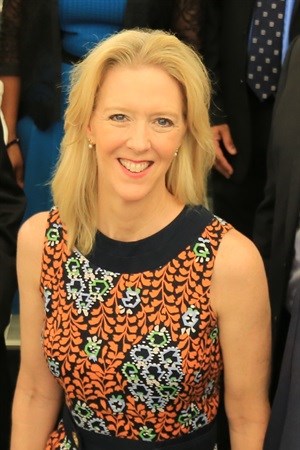





Named 2017's Most Influential Woman in Business for Botswana & SADC North by CEO Magazine, Adelman is passionate about developing sustainable methods to achieve food security in Africa and other emerging markets particularly with regard to the impact on the environment.
Here, Adelman shares why she chose a career in food security, the challenges she has faced and her message for women in business...

Happily, for me, no two days are the same. But life as an entrepreneur with three businesses can be hectic! Usually starts with (a lot of) coffee and a review of my personal deliverables list for the day. I usually spend an hour on emails before jumping into the agenda for the day, which often includes going to the farm, checking in with my teams, focusing on growth strategies, and generally solving problems! Whenever I can, I go to Bikram hot yoga at the end of the day to turn my brain off for 90-minutes of meditation and focus.
There are two reasons for me. First, in Africa at least 60% of people are farmers – mostly subsistence farmers where their only income or nutrition comes from the food that they grow. Further, 47% of the African population is malnourished. That’s just a math equation that doesn’t work. Africa has an agricultural system that is broken if 60% of the people are farmers but 47% of the people are hungry. You can’t have peace, stability and economic development when people are hungry. I believe agriculture and food technology is a big part of the solution.
One of the interesting projects we are working on to address this issue is a collaboration with the California, plant-based protein company JUST (former Hampton Creek). JUST has piloted a project in Liberia to fortify staple carbohydrate foods (in this case cassava porridge) with vitamins and plant-protein for just a couple of cents more per serving, and has packaged the product as an aspirational brand available in the local markets. The product is grown by smallholder farmers on a contract basis (out-growers) and made in a local factory that has created 100 jobs for women. We see the opportunity to expand this product line and roll it out across Africa to help address malnutrition and create local employment by improving the nutrition of everyday meals.
Second, if you look at the population growth projections to 2050 (most of which is coming from Africa and Asia) and the resulting protein food requirements of world, and you take the fact that we already use the majority of the world’s water in agriculture and that the livestock industry emits more CO2 gas than all the cars, trucks, buses, and airplanes combined... well, we have another math problem. Numerically, it just doesn’t work to create all the protein we need with the water and air resources we have.
Innovations like plant-based protein, technology-enabled agriculture and new supply chain systems are needed if we are going to have enough food to feed the planet (and still have a planet to live on). Our new companies Infinite Foods and Crossover Quality Meats are positioned to provide environmentally sensible and affordable protein to Africa and emerging markets.
There is a saying: "What you focus on expands". Africa can still be very patriarchal, and there are structural challenges to women being entrepreneurs beyond just social norms (e.g., access to finance, the legality of owning land in some countries) – yet we know that women are the heart of the African household. By having a month dedicated to women, we can take the time to focus on the real issues women face in our society and the solutions to transform.
I’m an engineer by training, so I like numbers to give me answers. If we don’t focus on women and empower them as equal members in our society and workforce – we are losing out on, well 50% of our potential!
I’ve been graced in my upbringing and career. I had supportive parents who said I could be whatever I wanted to be (as long as it wasn’t a ballet dancer and was a doctor, lawyer or engineer), and a great foundational career at Accenture that had a very performance-based culture that enabled me to thrive as a female executive. In my new found career as an entrepreneur and farmer, I use two techniques: (1) oblivion; (2) confusion! First, I never mentally put myself in a position where I don’t believe I can and should do the things I do (a.k.a oblivion). Second, I use the fact that I’m a woman (and therefore people are confused that I’m in the position I’m in) to my advantage.
I find that if people are confused, they don’t try to put you into their mental stereotype box of how they think they should treat you. You’d be amazed at the look on the manager at the electrical store full of men where I’m negotiating a great deal on supplies for a construction project when I say "I’m just a woman, you have to give me a better price!"
First, not everyone is cut out to be an entrepreneur (women or men). Some people are just more comfortable in the structure of a company or more stable organisation – and that’s OK. Being an entrepreneur is hard – 9 out of 10 businesses fail. If you want to be an entrepreneur, you have to be ready, tireless in everything you do: in your passion for your business, in your commitment to survive, and never stopping until you’ve solved the problem. I sometimes say I’m "chief strategist and problem solver."
Second, you need to know your field... in detail, and be willing to get your hands dirty. If you can’t personally run every function top to bottom in your organisation (at least at the beginning) you don’t know enough yet (and you probably aren’t going to survive).
Lastly, get some experience. Many young people just think "hey, I’m going to be an entrepreneur or an SMME" without having any job training or experience. Launching and running your own business requires skills, experience and the financial resources to survive. Don’t shy away from getting a job – even an internship – to build the skills and experience you will need to be successful on your own.
I don’t really have one – I have many! My parents, teachers, bosses, employees, team members all have put their imprint on me one way or another. More important than believing in an icon, you have to believe in yourself.
I want to go back to my numerical equation: If 50% of our population is women and we are not leveraging all that women bring to the table in business and society, then we are missing out on 50% of our opportunity. If we look at the economic and social challenges ahead of us – job creation, addressing malnutrition and poverty just to name a few – these are complex problems and we need everybody’s skills, energy and ideas to solve them. Why would we try to do that with only half of the cards in our deck to play with?
Be fearless.